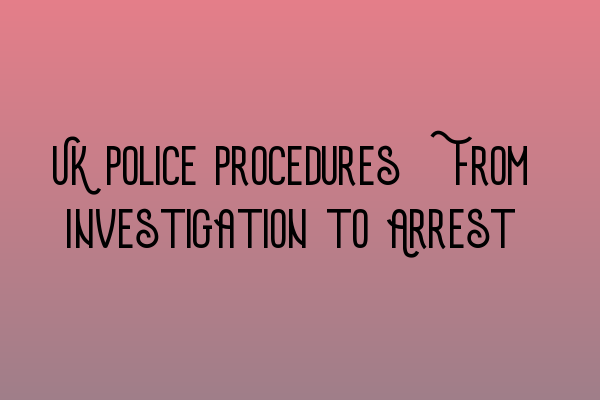UK Police Procedures: From Investigation to Arrest
When it comes to criminal law in the UK, understanding the process from investigation to arrest is crucial. Whether you are studying to become a solicitor, preparing for the SQE exams, or simply interested in the field, this guide will give you a comprehensive overview of UK police procedures.
Investigation Stage
The investigation stage is where the police conduct their initial inquiries to gather evidence and build a case. This stage often involves interviewing witnesses, collecting physical evidence, and analyzing any available CCTV footage. The police may also seek assistance from forensic experts or other specialists to aid in the investigation.
During this stage, it is important for solicitors to advise their clients on their rights and responsibilities. Understanding the scope of police powers, including the need for search warrants and the rules surrounding stop and search procedures, is essential.
If you are preparing for the SQE exams, make sure to test your knowledge with our SQE 1 Practice Exam Questions to solidify your understanding of police investigation procedures.
Arrest Stage
Once the police have gathered sufficient evidence through their investigation, they may decide to make an arrest. The decision to arrest an individual is based on reasonable suspicion that the person has committed a criminal offense. It is important to note that an arrest does not equate to guilt. Rather, it is a step in the legal process to bring the suspect before the court.
During the arrest stage, solicitors play a crucial role in ensuring their clients’ rights are protected. This includes advising them on the right to remain silent, the right to legal representation, and the importance of not making any self-incriminating statements.
To further enhance your understanding of arrest procedures, we recommend exploring our SQE 1 Practice Mocks FLK1 FLK2 for realistic scenarios that test your knowledge of the arrest process.
Conclusion
UK police procedures from investigation to arrest form the foundation of criminal law. As a solicitor, understanding these procedures is essential in providing effective legal representation to clients. For aspiring solicitors preparing for the SQE exams, it is crucial to have a solid grasp of these procedures to excel in your studies.
If you are looking to enhance your knowledge and prepare for the SQE exams, explore our comprehensive SQE 2 Preparation Courses and SQE 1 Preparation Courses designed to equip you with the necessary skills and knowledge.
Stay updated with the latest SRA SQE exam dates by visiting our SRA SQE Exam Dates page.
